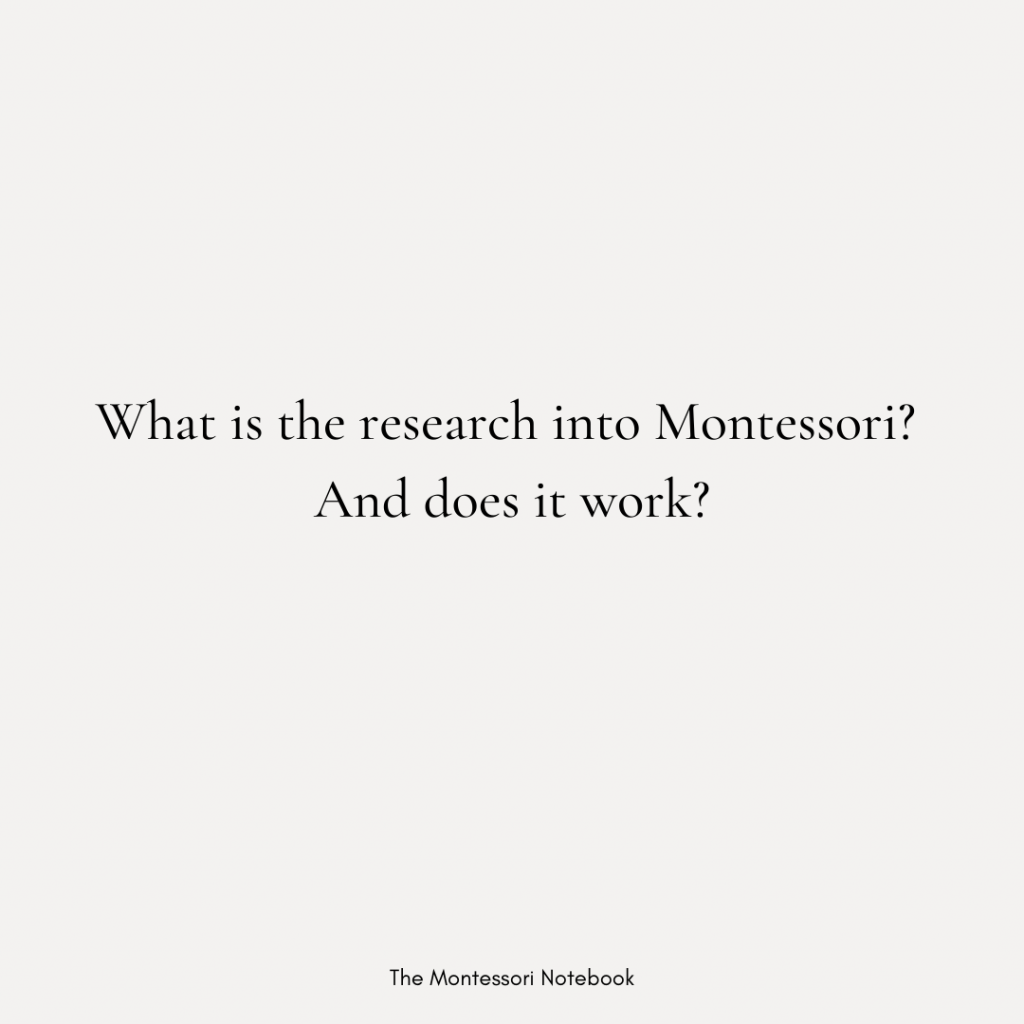What is the research into Montessori? And does Montessori work?
For Montessori to be accepted as not just an alternative method to education, it’s so important that more and more research is coming out for us to scientifically understand the Montessori method that has been in use for more than 100 years. So does Montessori work?
I am no scientist myself but I have compiled a list for you of the places you can find studies about the Montessori approach for you to dive into. Read on…
And for those looking for a quick answer to the commonly asked “Does Montessori Work?”, I love this summary put together by the National Center for Montessori in the Public Sector.

Books about Montessori reseach
1. The Science Behind the Genius
This book by Angeline Stoll Lillard, PhD is the book to buy about Montessori research. It looks at 8 principles of Montessori education and the research supporting these principles. Suitable for both parents and teachers.
I’ve had the honour to hear her speak at many Montessori conferences and she is able to make in-depth research accessible to all audiences.
(Fun fact: Angeline was also an early reader of The Montessori Baby and – without being asked – kindly did a full proofread as well as adding comments from her research perspective.)
2. The Bloomsbury Handbook of Montessori Education
“Divided into six sections the handbook encompasses a range of topics related to Maria Montessori and Montessori education including foundations and evolution of the field; key writings; pedagogy across the lifespan; scholarly research; global reach; and contemporary considerations such as gender, inclusive education, race and multilingualism. Written by scholars and practitioners based in over 20 countries, this is the go-to reference work for anyone interested in Montessori education.”
3. Visual Thinking Strategies in Montessori Environments
This book by National Center for Montessori in the Public Sector is “is written for adults who are working with children in Montessori learning environments. Drawing from nearly three decades of research on Visual Thinking Strategies (VTS), aesthetic development, and critical thinking, combined with a growing body of work on human development, deep literacy, and transformational educational initiatives, this book will equip you— the Montessori educator—to make the most of VTS within the Montessori context.”
4. The Inclusive Classroom: Creating a Cherished Experience through Montessori
This book “describes and includes examples of how to modify or re-present Montessori lessons for children with learning challenges.”
5. Montessori Inclusion: Strategies and Stories of Support for Learners with Exceptionalities
This book edited by Ann Epstein offers “a roadmap for true Montessori inclusion, this collaborative anthology describes basic special education terminology and how it relates to Montessori, as well as the details of inclusive and innovative model schools.”
6. Powerful Literacy in the Montessori Classroom: Aligning Reading Research and Practice
“This book aligns Montessori didactic materials and pedagogy, developed over a century ago, with current research on reading development. Readers will gain a solid overview of the Montessori philosophy and method, specifically those related to reading and language development, enabling them to support their practice in today’s educational context while inspiring the wider field of education.”
Where to find Montessori research studies
1. National Center for Montessori in the Public Sector
They have a super comprehensive page of Montessori research here including links to:
- Does Montessori Work? What the Research Says (or this version with an extensive bibliography of the research)
- Public Montessori Raises Achievement, Closes Gaps
- Montessori Shows Strengths Across Race and Income
- Reading and Math Achievement for African American Lower Elementary Students in Public Montessori Programs
- Links to public studies
2. American Montessori Society
AMS also has a comprehensive overview of Montessori research here including:
- the Journal of Montessori Research
- a research library – including dissertations and theses, peer-reviewed journal articles, and white papers
- resources for Montessori research – including funding for research
3. Montessori Public Policy Initiative (MPPI)
This is a joint collaboration between AMI-USA and AMS and link to a selection of Montessori Research studies here.
4. Montessori for Social Justice
Follow them on social media to hear when they are running the next in the Free Your Mind Montessori Research Series – the last was held yesterday on 23 February “Transforming Roles: Culturally relevant Pedagogy and Anti Bias – Anti Racist Curriculum in a Montessori Setting”
5. American Educational Research Association Montessori Special Interest Group
Aera.net have a special interest group for Montessori here. The recordings from their conference on “Racial Justice and Equity in Montessori Research” from January 2021 can be found here
6. Association Montessori Internationale
They have a selection of researchers explaining their work, for example:
- A video explaining the Study of Montessori Education in South Carolina’s Public Schools Brooke Culclasure 2018 Montessori Forum (link to the full study here)
- What is Resilience? by Laura Flores Shaw 2019 AMI AGM
- “Montessori education has a meaningful and positive impact on child outcomes, both academic and nonacademic, relative to outcomes seen when using traditional educational methods.” Montessori education’s impact on academic and nonacademic outcomes: A systematic review, 2023
7. Montessori Europe Research Group (affectionately known as MERGe)
You can find out more about MERGe here.
8. White Paper Press
White Paper Press was founded by Dr. Laura Flores Shaw. This is a paid subscription issued each year with valuable white papers to (from their website):
- Attract and retain students
- Help parents understand Montessori from a scientific perspective
- Provide third-party validation for parents who love Montessori but still feel anxiety for making an “alternative” educational choice for their children
- Create parent educationals
- Train teachers to answer parent questions using the science behind Montessori
- Train admissions directors to better explain Montessori to prospective parents
- Build relationships with local universities and researchers
9. Other (via National Center for Montessori in the Public Sector)
- Center for Montessori Studies at the University of Hartford
- University of Kansas Center for Montessori Research
All that said, I’ll confess that I personally don’t need a scientific study to tell me that Montessori works to be on board. I like the way I feel when I’m not shaming, bribing or threatening a child but working with them to have their needs met (and our own). I love observing the child developing their full potential, seeing them love learning, being curious, having deep and interesting conversations.
And it’s also important to be scientific, just as Dr Montessori was, and keep going with Montessori research to get Montessori accepted as a mainstream way to educate our children.
* links may take you to amazon.com to my Amazon bookstore

Simone Davies has more than 20 years’ experience as an AMI Montessori educator. Simone is the author of “The Montessori Toddler” and co-author of “The Montessori Baby” and “The Montessori Child” books, comprehensive guides to raising children in a Montessori way. She currently runs parent-child Montessori classes in Amsterdam at her school Jacaranda Tree Montessori. She also has a popular blog, instagram and podcast “The Montessori Notebook” and is mother to two young adults.